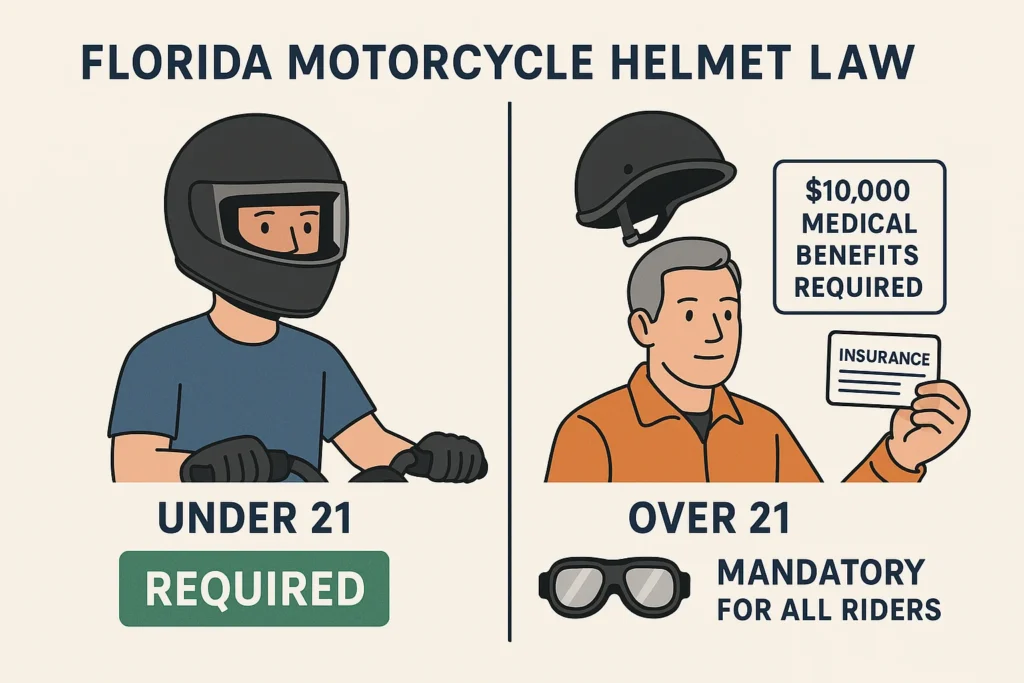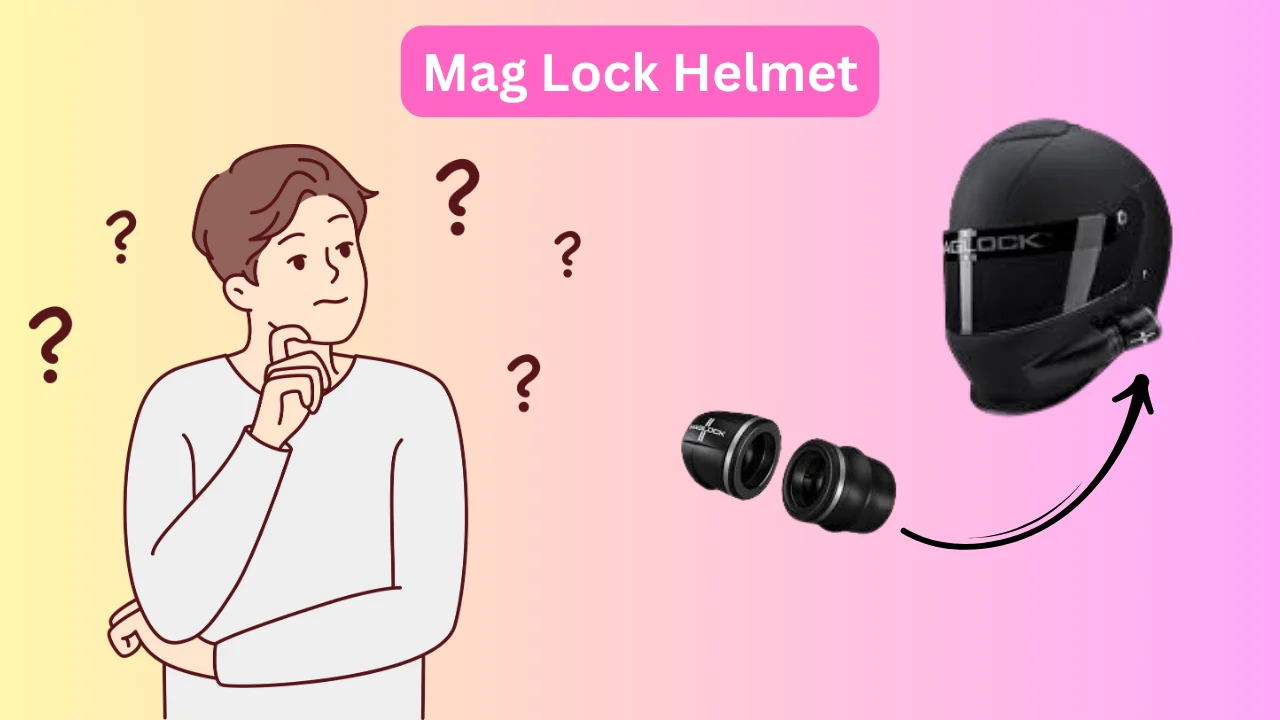When I first started riding in Florida, one of the first questions I had was simple: are motorcycle helmets required in Florida? I had heard different things from different riders. Some told me I could ride free without one. Others swore the law said I had to wear one no matter what. Instead of relying on hearsay, I decided to really dig into Florida motorcycle helmet laws for myself. What I found was surprising and honestly a little confusing at first.
So if you’re a fellow rider, or maybe even a passenger, this guide is for you. I’ll break it down. No legal jargon. Just the facts, the risks, and what it really means for bikers like us on Florida roads. Discover how much you should expect to spend on protective gear with How much is a motorcycle helmet.
What Are the Motorcycle Helmet Laws in Florida?
Here’s the short version: Florida law does not require all motorcycle riders to wear helmets. But it depends on your age and your insurance.
- If you are under 21 years old, you must wear a helmet. No exceptions.
- If you are 21 or older, you can legally ride without a helmet only if you carry an insurance policy with at least $10,000 in medical benefits for injuries from a crash.
- Regardless of age, all riders and passengers must wear eye protection when riding on public roads.
When I first read this, it honestly felt a little odd. The state gives freedom to adults but ties it to whether you have medical coverage. In one way, it respects personal choice. But in another way, it acknowledges that riding without a helmet puts you at higher risk, and at least some insurance is needed to cover that risk.
Are Motorcycle Helmets Required in Florida & Why Florida Changed the Helmet Law
Back in the late 1990s, helmets were required for everyone in Florida. But in 2000, lawmakers changed the rule. From that point on, adults over 21 could ride without a helmet if they met the insurance requirement.

But here’s where it gets concerning. Studies have shown that motorcycle deaths went up significantly after the helmet law was relaxed.
- Before the law change, from 1997 to 1999, there were 515 rider deaths.
- After helmets became optional, from 2001 to 2003, the number jumped to 933 deaths.
That’s nearly a 50 percent increase in fatalities.
So yes, you may legally ride without a helmet in Florida, but the data is clear: not wearing one puts your life at much greater risk.
My Personal Take as a Rider
When I first moved here, I’ll admit I enjoyed the freedom of riding without a helmet. The wind in my face, the open road, it felt incredible. But then I had a minor accident. I was wearing a helmet that day, and I thank God I did. The scratches on my helmet told me what could have happened to my skull.
Since then, I have never gone on the road without a helmet, even though I legally could. For me, the risk just isn’t worth it. Helmets are not about style. They’re about survival.
Do Motorcycle Passengers Have to Wear Helmets in Florida?
Yes, the law also applies to passengers.
- If your passenger is under 21, they must wear a helmet, no matter what.
- If they are 21 or older and have the proper insurance, they can ride without a helmet.
- Eye protection is always required for passengers too.
When I ride with friends or family, I make it a personal rule that everyone wears a helmet, regardless of age. It just feels irresponsible to put someone I care about at unnecessary risk.
Why Wearing a Helmet Is So Important
Cars have airbags, seat belts, and reinforced frames. As bikers, we have none of that. We are exposed. A helmet is one of the only pieces of protection we can count on.
Government data proves the point:
- Riders without helmets are three times more likely to suffer a traumatic brain injury in a crash.
- Riders with helmets are far more likely to survive an accident than those without.
- Florida has one of the highest motorcycle fatality rates in the country, and the loosened helmet laws play a role in that.
Think of it this way: riding without a helmet is like driving a car at 70 mph without a seatbelt, hoping you’ll never crash. You might be fine most days. But the one time something goes wrong, you’ll wish you had strapped in. Find answers and legal clarity in your area with Are Bluetooth motorcycle helmets legal.
Motorcycle Helmet FAQs for Florida Riders
I get a lot of questions from fellow bikers about helmets, so let’s cover a few.
1. How much does a motorcycle helmet cost?
It really depends. A basic, DOT-approved helmet can cost around $100 or less. High-end helmets with fancy designs or extra safety features can run over $1,000. Personally, I ride with a mid-range helmet that costs me about $250. For me, it’s the right balance between comfort, style, and safety.
2. How often should you replace your helmet?
Most helmet makers say you should replace it every 3 to 5 years, or immediately after a crash. Even a minor drop can weaken the helmet’s ability to protect you, so don’t take chances.
3. Can I still recover compensation if I wasn’t wearing a helmet in a crash?
Yes, you may still be able to recover damages. Not wearing a helmet usually does not cause the crash itself. But it can impact how severe your injuries are, and insurance companies might try to use that against you. If you ever find yourself in this situation, I recommend speaking to a motorcycle accident lawyer.
Florida Motorcycle Fatality Rates
The numbers are sobering.
- In 2020, 552 motorcyclists died in Florida crashes.
- In 2021, that number rose to 621.
- Nearly 2,000 riders suffered severe, life-changing injuries in 2021 alone.
The CDC estimates that motorcycle fatalities in Florida cost nearly $1 billion each year in medical expenses and lost wages. That’s a huge price to pay, both in dollars and in human lives.
Why Accurate Information Matters for Riders
One thing I’ve learned is that many bikers ride around Florida with a false sense of security. Some think the law fully protects them if they choose not to wear a helmet. Others assume they can’t get compensation if they weren’t wearing one.
The truth is more nuanced. Knowing the law and making smart personal choices is critical. At the end of the day, the law gives us freedom, but freedom comes with responsibility.
Practical Tips for Florida Riders
If you ride in Florida like I do, here are some tips I follow myself:
- Always wear a DOT-approved helmet. Even though the law gives us a choice, I choose safety.
- Check your insurance coverage. Make sure your policy has at least $10,000 in medical benefits, especially if you ever plan to ride without a helmet.
- Protect your eyes. A helmet with a visor or at least a good pair of riding goggles is a must. Debris on the road can blind you in an instant.
- Educate your passengers. Don’t let friends or loved ones take unnecessary risks. Helmets for everyone on board.
- Stay visible. Bright gear and reflective strips on your helmet can make you easier to spot, especially at night.
My Final Thoughts on Florida Helmet Laws
So, are motorcycle helmets required in Florida? The answer is yes for some, no for others. But the bigger truth is this: helmets save lives, whether the law requires them or not. Get clarity on longevity and replacement guidance with How long are motorcycle helmets good for you.
As a biker, I treasure the freedom of the open road. But I also know how fragile life can be on two wheels. Wearing a helmet has become non-negotiable for me. It’s not just about following the law, it’s about coming home to my family after every ride.
If you’re riding in Florida, I encourage you to learn the law, respect the risks, and make the smart choice. At the end of the day, your helmet might be the single thing that decides whether your story continues after a crash. Explore top-rated choices in our guide on What are good motorcycle helmets.





